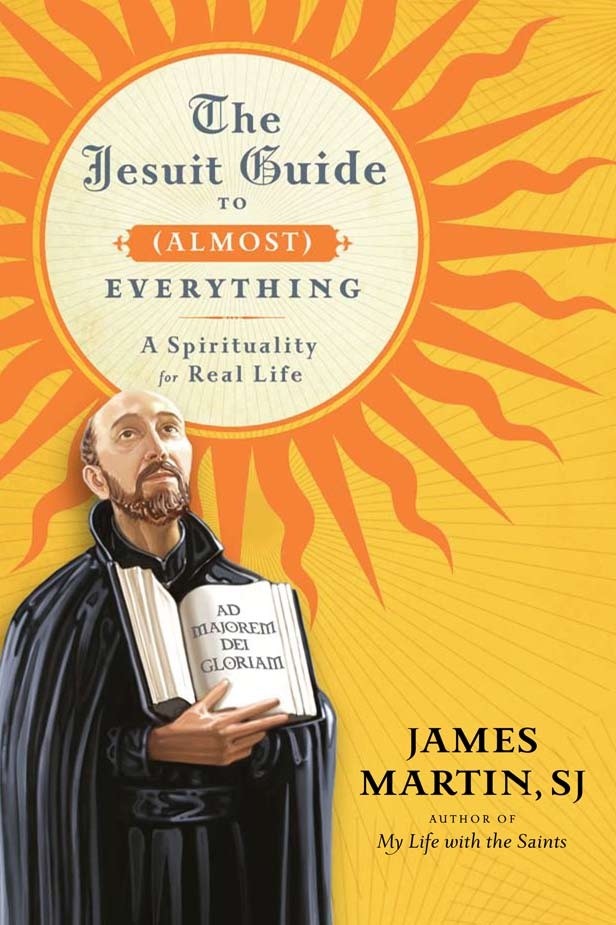9 reasons you need to read James Martin, S.J.’s Jesuit Guide to (Almost) Anything

In Twenty-Seven | What I’ve Learned This Far, I cited this particular book as a wonderful starting point for anyone looking to reflect and deepen their knowledge of themselves on this level. I tend to read books with a pencil in hand, but this one is impossible to get through without one. It took me a really long time to get through it, not because it was uninteresting… on the contrary, while the material James Martin S.J. covers is dense and requires a lot of reflection and processing, he writes in true Jesuit fashion making the teachings of St. Ignatius accessible for all with more than a few moments of real laugh-out-loud humor. Whether your goal is to get to deepen your sense of self, learn more about St. Ignatius and his friends, or get a better understanding of Jesuit teachings, here are 9 points that Martin, S.J. makes… and my arguments for why you should pick up a copy and start the trek through this book today, if not sooner.
You may think about spirituality less as something ideologically unattainable and more as something present throughout your day.
Ignatius considers everything an important element of your life. That includes religious services, sacred Scriptures, prayer, and charitable works, to be sure, but it also includes friends, family, work, relationships, sex, suffering, and joy, as well as nature, music, and pop culture. (5)
Understanding spirituality is also a way to deepen and improve your friendships (and all relationships).
[One] aspect of healthy relationships is change. Friendships that begin in childhood and adolescence can be among the richest of all. Yet if we don’t allow the other person to change, the friendship will not deepen and mature. Still, as with a friendship, change can be threatening in a person’s relationship with God. (134)
Learning about these practices can even make you a better lover.
Love freely. One of the hardest parts of love is this: allowing the other to love you as he or she can, not as you want to be loved… Accepting them as they are means not only trusting in their love, but respecting how they chose to love. (229)
You’ll realize every part of your life, even something as small or as mundane as “work,” can and should be purposeful.
Work can be prayerful if done contemplatively. “Hands to work, hearts to God,” as the Shakers used to say. Sometimes when I’m washing dishes or ironing… I lose myself in the task and am reminded of doing small things with love. (173)
Living a spiritual life means working hard at a life of purpose, but it also means living in the present and enjoying the gifts around us.
We are gradually losing the art of silence. Of walking down the street lost in our own thoughts. Of closing the door to our rooms and being quiet. Of sitting on a park bench and just thinking. We may fear silence because we fear what we might hear from the deepest parts of ourselves. We may be afraid to hear that “still small” voice. What might it say? (141)
You will learn to accept your limitations as a human being.
Every state of life, every decision, includes some pain that must be accepted if you are to enter fully into those decisions, and into new life… There is no perfect decision, perfect outcome, or perfect life. Embracing imperfection helps us relax into reality. When we accept that all choices are conditional, limited, and imperfect, our lives become, paradoxically, more satisfying, joyful, and peaceful. (338)
Each of our decisions lead us to become the people we are meant to be… and changing course is part of discovering our best selves.
Reaching your goal, Ignatius realized, sometimes means changing paths. Sometimes it even means turning around. (311)
You will be challenged to slow down, enjoy life, and show gratitude.
For Ignatius many things—no matter how seemingly inconsequential—are occasions for gratitude (the surprising sight of sunlight on the pavement in the middle of a bleak midwinter’s day, the taste of a ham-and-cheese sandwich you had for lunch). You recall them and you “relish” or “savor” them, as he would say. Savoring is an antidote to our increasingly rushed lives. (88)
And remember to live with passion and love.
“What you are in love with, what seizes your imagination, will affect everything. It will decide what will get you out of bed in the morning, what you will do with your evenings, how you will spend your weekends, what you read, who you know, what breaks your heart, and what amazes you with joy and gratitude. Fall in love, stay in love and it will decide everything.” – Pedro Arrupe, S.J. (219)
My parting words…
Martin, S.J. shares personal stories that illustrate faith in everyday life, grapples with the question of suffering, explores the make-up of healthy friendships and relationships, offers processes to make conscious and meaningful decisions, suggests that our life’s work can indeed be more meaningful than financial wealth, and challenges us to discover ourselves at our core, within the world, and in relation to God (or whichever higher power you believe in). His smart humor and carefully crafted words make these seemingly large ideas available for us to digest and savor. Whatever you believe, this guide will encourage you to face who you are and how you can evolve into the person you want to be.
Catherine Abalos is founder and editor of The Single Diaries.





























